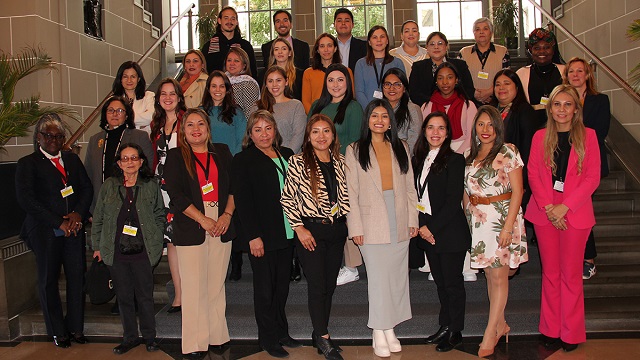Curso sobre comercio y cuestiones de género dirigido a funcionarios de la OMC
Curso de formación de cuatro días sobre comercio y cuestiones de género, que se concluyó el 18 de abril reunió a 27 funcionarios.

19 de abril de 2024.- The training course gave participants a practical understanding of the relationship between trade and gender equality, including how trade affects men and women differently, and how gender-responsive trade policies promote women’s economic growth and poverty reduction.
The programme included an overview of the WTO’s work on trade and gender and looked at the social aspect of trade and gender issues. A key element was the presentation of concrete tools for designing, developing and implementing gender-responsive trade policies.
The course also provided an overview of policies to support women entrepreneurs and introduced participants to trade and gender issues relating to climate change as well as the trade implications of gender-based violence.
Participants shared experiences and best practices on women’s economic empowerment and actively engaged in discussions on practical pathways to integrate gender issues in trade policymaking. They worked on tailored roadmaps to support progress of their respective governments towards achieving gender equality objectives in trade.
The case studies and group exercises provided an opportunity for participants to look at women’s empowerment in various sectors, such as agriculture, tourism, fisheries, as well as male-dominated sectors like the mining industry.
Claudia Guillermina Parra Silva, Director General of Foreign Trade Facilitation in Peru’s Ministry of Foreign Trade and Tourism, said the course efficiently outlined the mechanisms to implement gender-responsive policies. “The group work and the methodology used by the trainers allowed us to put into practice the theory and to generate an enriching discussion with other officials from Latin America and Africa, fuelled by the perspectives of each country,” she added.
Felipe Sergio Amaya Gómez, Manager at Colombia’s Directorate of National Taxes and Customs, said the course’s content and methodology were very enriching. “The training provided us with the tools to identify and diagnose the obstacles women face in international trade, and this will allow us to take measures, as well as subsequently evaluate the improvement of women’s participation in trade,” he noted.
According to Francisco Javier Vicencio Macaya, Advisor in the Inclusive Trade Department of Chile’s Ministry of Foreign Affairs, the knowledge acquired during the course will be instrumental in promoting Chile’s Feminist Foreign Policy, which includes the introduction of gender provisions in trade agreements.
“This course provides vital elements that will help us to deepen and innovate in the implementation of our trade policy with a gender perspective,” he said. “The course will also help us with the promotion of trade and gender issues in international bodies in which we participate, such as the Inclusive Trade Action Group, the Global Trade and Gender Arrangement, the Asia-Pacific Economic Cooperation, and also the Pacific Alliance itself, among others.”
Carolina María Rosales Rodriguez, Professional Advisor on Planning, International Cooperation, Trade and Gender in Guatemala’s Ministry of Economy, said participating in the course was essential. “For Guatemala, it is very important that we can not only achieve gender equality, but also apply gender equity and be able to give all women the same treatment and the same opportunities in trade as men, to be able to empower more women economically, and support them in transcending borders.”
















